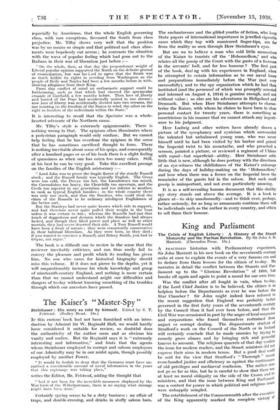The Kaiser's " Master-Spy "
Steinhauer : His story as told by himself. Edited by S. T. Felstead. (Bodley Head. 18s.)
IF this curious hook had not been furnished with an intro- duction by Admiral Sir W. Reginald Hall, we would hardly have considered it suitable for review, so doubtful does the authenticity of the author seem and so obvious his vanity and malice. But Sir Reginald says it is " extremely interesting and informative," and hints that the agents whom Steinhauer employed to corrupt and suborn employees of our Admiralty may be in our midst again, though possibly employed by another Power.
" It would be foolish to deny that the Germans must have un- earthed a considerable amount of naval informatiou iu the years that this espionage was taking place,"
writes the Editor, Mr. Felstead, adding the thought that
" had it not been for the incredible meanness displayed by the War lords of the Wilhelinstrasse, there is no saying what damage might have been done."
Certainly spying seems to be a dirty business : an affair of traps, and double-crossing, and drinks in stuffy saloon bars.
The enchantresses and the gilded youths of fiction, who keep State papers of international importance in jewelled cigarette cases which they tap with manicured finger-tips, are far from the reality as seen through Herr Steinhauer's eyes.
But are we to believe a man who sold little mementoes of the Kaiser to tourists off the Hohenzollern,' and who relates all the gossip of the Court with the gusto of a footman in the servants' hall, and far less humour ? The first port of the book, deal ng with Isis experiences in England, when he attempted to obtain information as to our naval bases and preparations immediately before the War (not very successfully), and to the spy organization which he had they m' stituted (and the personnel of which was promptly arrested and interned on August 4, 1914) is genuine enough, and not without value ; as also are his adventures in Heligoland and Denmark. But when Herr Steinhauer attempts to charm, terize the Kaiser, with whom he claims to have been in close personal contact for twenty years, there is something so meretricious in his manner that we cannot attach any import. anee to his judgment.
Herr Ludwig and other writers have already drawn a picture of the sycophancy and cynicism which surrounded the talented but unbalanced young man, who was never himself until he had been visited by his barber and gained the Imperial twist to his moustache, and who preached a sermon, painted a picture, or reviewed a regiment of Uhlarts with equal—but superficial—ability. Herr Steinhauer adds little that is new, although he does portray with the directness of an eye-witness the childishness of the Kaiser's entourage during the days of holiday-making on the Hohenzollern,' and how when there was a frown on the Imperial brow the remainder of the guests hid in the saloon. But such small gossip is unimportant, and not even particularly amusing.
It is as a self-revealing human document that this shabby spy story stands out above the average. It is a book to glance at—to skip unashamedly—and to think over, perhaps, rather seriously, for as long as armaments continue there will be individuals such as the author in every country, and others to sell them their honour.








































 Previous page
Previous page